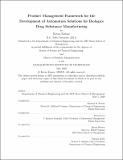Product management framework for the development of automation solutions for biologics drug substance manufacturing
Author(s)
Kumar, Ketan.
Download1191623494-MIT.pdf (1.012Mb)
Other Contributors
Sloan School of Management.
Massachusetts Institute of Technology. Department of Chemical Engineering.
Advisor
Richard D. Braatz and Retsef Levi.
Terms of use
Metadata
Show full item recordAbstract
This thesis presents a product management framework for the development of innovative manufacturing automation solutions, and the application of this framework to the development of automation for a continuous biomanufacturing platform at Amgen. A recently formed team at Amgen - Next Gen Automation (Drug Substance)(NGA(DS)) - is working to develop innovative automation solutions that support Amgen's strategic initiatives. Being an innovation team, NGA(DS) faces uncertainty regarding what aspects of the existing process are best suited to be improved using automation and what the best automation solutions are to achieve these results. The framework presented in this thesis provides NGA(DS) a methodology to develop useful solutions in the presence of this uncertainty. Supporting automation development for the continuous biomanufacturing platform is one of the work streams of NGA(DS), and was used as a case study for the development of the product management framework. Several prominent innovation and product management frameworks were lever-aged in the development of the framework for this project, including Lean Startup and Disciplined Entrepreneurship. As recommended by the sources studied, this project modelled innovation as a collaborative and iterative process of testing hypotheses regarding the value of the product being developed. Specific tools and concepts were applied from the source frameworks, as relevant to the teams's needs. The framework developed in this project consisted of two phases - Opportunity Analysis and Solution Development - with multiple data collection and analysis activities in each phase. Results from the activities were validated through reviews by the NGA(DS) team leadership and other relevant Subject Matter Experts within Amgen. The framework developed in this project is intended to guide future decision making for product development activities by NGA(DS).
Description
Thesis: M.B.A., Massachusetts Institute of Technology, Sloan School of Management, May, 2020 Thesis: S.M., Massachusetts Institute of Technology, Department of Chemical Engineering, May, 2020 Cataloged from the official PDF of thesis. Includes bibliographical references (pages 119-122).
Date issued
2020Department
Sloan School of Management; Massachusetts Institute of Technology. Department of Chemical EngineeringPublisher
Massachusetts Institute of Technology
Keywords
Sloan School of Management., Chemical Engineering.